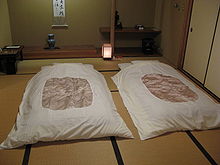Ryokan

A ryokan ( Japanese 旅館 , literally: guest house ) is a traditionally furnished Japanese hotel .
Prices and usage
Ryokans designed for tourism usually include breakfast and dinner in the price. However, if you book at short notice, it may only be possible to get an overnight stay without meals ( 素 泊 ま り sudomari ). Prices are usually between 8,000 yen and 20,000 yen per night and person, an overnight stay without meals costs from 4,000 yen per night and person. Usually there are no single rooms; As you sleep on futons , the occupancy of the rooms is flexible. There are also ryokans that are mainly used by craftsmen and business travelers and offer less service at lower prices.
Furnishing
The rooms are designed in a traditional Japanese style: the floors are covered with tatami mats, the sliding doors ( shoji ) are covered with washi and there is a small, slightly raised area in the room called a tokonoma ( 床 の 間 ), in which there is a flower arrangement or one Can hang calligraphy. Often there is also a veranda, which can be separated from the room with sliding doors and which is often glazed to the outside.
A ryokan usually has a spacious shared bathroom ( onsen or sentō ) and lounges that can be used by all guests. The shoes are taken off at the hotel entrance or at the latest at the room entrance, whereby an employee takes them and hands them back later. Slippers provided by the hotel are worn in the ryokan. The provided yukata can be worn not only in the hotel, but also outside.
When you move into a room in a ryokan, there is usually only a 30 cm high table on which green tea and typical local pastries or sweets are available for reception . Dinner and breakfast are also often served here, but in some cases also in the in-house restaurant or dining room. The meals are traditionally Japanese and usually very rich, but often very expensive as a result.
After dinner, the servants put the table in an adjoining room or a corner and spread the futons on the tatami mats as a bed for the night. In the morning they are removed again.
History and legal requirements
High-quality hostels have been called ryokan since the Edo period , the term itself being borrowed from the Chinese language . However, it did not become common in common parlance until the middle of the 20th century.
The 1948 Japanese Hostel Act ( 旅館 業 法Ryokan gyōhō ) divides accommodation into western-style hotels, Japanese-style ryokans, simple accommodation and other accommodations, with many ryokans also having the word hotel in their name. Ryokan is also the generic term for all types of accommodation facilities in Japan due to the same law.
In 1995 there were 72,600 ryokans and 7,174 hotels in Japan, with hotels averaging 75 rooms and ryokans only 14. Currently the number of ryokans is falling while that of hotels is increasing. In many cases, aging ryokan owners, who are usually family-run, have found it difficult to find successors today.
A well-known ryokan and at the same time one of the most exclusive hotels in the world is the Tawaraya Ryokan in Kyoto , which has been in operation for 300 years and 12 generations . It has 18 rooms in which one night costs about 350 euros. Famous people like Jean-Paul Sartre and Simone de Beauvoir , Karl Gustav and Silvia of Sweden , Leonard Bernstein , Marlon Brando and Barbra Streisand have stayed here . The oldest ryokan are the Nishiyama Onsen Keiunkan, founded in 705 in Hayakawa, and the Hōshi in Awazu-Onsen, Komatsu (Ishikawa), founded in 718 .
literature
- Gabriele Fahr-Becker: Ryokan - a guest in traditional Japan . Könemann in Tandem Verlag GmbH, Königswinter 2005, ISBN 3-8331-1222-0 , 336 S. Basic standard work; numerous, mostly colored photos and illustrations; deals with ryokan types and the influence of typical customs, customs and traditions on ryokans in psychological, sociological and architectural terms.
Web links
References and comments
- ↑ Arima Onsen in the English language Wikipedia
- ↑ Ryokan. In: Travel to Japan. Retrieved on August 19, 2019 (German).


